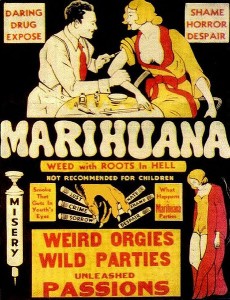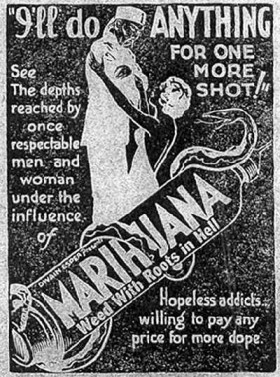 A new study put out by the World Health Organization, compiling 20 years of research, has come to the conclusion that cannabis is worse than Ebola. Ok, not really. But to read the headlines surrounding this study, you’d be forgiven for thinking that weed is knocking doors down and beating your mother unconscious with a waffle iron.
A new study put out by the World Health Organization, compiling 20 years of research, has come to the conclusion that cannabis is worse than Ebola. Ok, not really. But to read the headlines surrounding this study, you’d be forgiven for thinking that weed is knocking doors down and beating your mother unconscious with a waffle iron.
For instance, British news rag, The Daily Mail, has this as their headline: “The Terrible Truth About Cannabis: Expert’s Devastating 20-Year Study Finally Demolishes Claims That Smoking Pot Is Harmless.”
And what, pray tell, were the findings? Here’s a summary, from the Daily Mail:
- One in six teenagers who regularly smoke the drug become dependent
- It doubles risk of developing psychotic disorders, including schizophrenia
- Heavy use in adolescence appears to impair intellectual development
- Driving after smoking cannabis doubles risk of having a car crash
- Study’s author said: ‘If cannabis is not addictive then neither is heroin’
- The drug is currently legal in two states – Washington and Colorado
- A further 21 states have allowed it to be used for medicinal purposes
- Obama said earlier this year cannabis is not as dangerous as alcohol
To me, this reads like a recycled ‘news’ story and a cannabis witch hunt. These ‘devastating’ bullet points not only reveal absolutely nothing new, but they aren’t that damning, either. I don’t really think that our side of the debate is claiming that cannabis is totally harmless. I do think that, when compared to both legal and illicit drugs, it is the MOST harmless substance and one that has a cadre of medicinal benefits. Tylenol and peanuts have killed more people this year than weed has, ever. Sounds like it should be on par with heroin, right?
Another article states that the author of the study, Professor Hall is “…careful to make clear in his assessments the importance of taking into account associated lifestyle behavior and other explanations for risk. For example, he acknowledges that early concern about risk of lung damage from smoking cannabis is difficult to disentangle from associated tobacco use.” Also in this bucket is the fact that many of these stoned driving crashes included the presence of alcohol as well.
 The study’s author even states that it’s hard to determine the true detriment of cannabis because it’s very challenging to parse it out from other lifestyle factors as the true, root cause of said affliction. What you will find scattered throughout the study are phrases like “appears to,” “may cause,” and “might increase.” In science, we have to be careful not to assume that correlation equals causation.
The study’s author even states that it’s hard to determine the true detriment of cannabis because it’s very challenging to parse it out from other lifestyle factors as the true, root cause of said affliction. What you will find scattered throughout the study are phrases like “appears to,” “may cause,” and “might increase.” In science, we have to be careful not to assume that correlation equals causation.
For instance, if I was brewing my morning tea and everyday, just as the water boiled, the sunrise became visible, from my singular perception, I could conclude that boiling water causes the sun to rise. The boiling water and the sunrise are correlated in my view, but one does not cause the other. This is a gross over-simplification, but the point is valid.
No one is arguing that cannabis is not a drug or that it is 100% safe for every person on the planet. I’m certainly not arguing that cannabis should be given to healthy children. A kid is still developing mentally and physically and I don’t think any substances should be introduced into that dynamic. However, as a parent of teenagers, I’m going to feel much less concerned about my boys trying a joint than I would be if they picked up a cigarette or a beer (or worse).
Is cannabis addictive? Perhaps, depending on your definition of the term. It is certainly habit forming because, for those who grow to love it, it helps improve the quality of their life. Exercise and vitamins are also habit forming. But is it addictive like cigarettes or alcohol or heroin? Not even close. I take cannabis breaks several times annually. I’ll go anywhere from 1-3 weeks without any at all. To be honest, I do have mild ‘withdrawal’ symptoms, but they pale in comparison.
I started to smoke cannabis because I have horrible insomnia. After 15 years of ineffective sleeping pills and herbal extracts, I finally got over my stigma with cannabis and gave it a try. After that first smoke, I slept more soundly than I had since I was younger than 6 years old. So, my ‘withdrawal’ symptoms are a return to insomnia. It is the insomnia that makes me irritable and unable to eat or function. Weed is the cure.
Most of the cigarette smokers I know can’t even go 4-5 hours without becoming rage-beasts if they don’t get their nicotine fix. The withdrawals are exponentially worse for heroin. How do I know that? Because people trying to kick heroin are given methodone, which is a strong, addictive drug in its own right. Those trying to quit tobacco have nicotine patches and gum. There are no weaning devices for cannabis “addiction” and that is because on the physiological level it’s really not that hard to put it down and walk away.
And what of long term use?
I have been a daily smoker of cannabis for over a decade, and a pretty heavy amount compared to the average recreational user. I recently had a doctor’s exam and was told I was perfectly healthy by a trained physician. I can tell you with 100% certainty that had I even had alcohol half as often as I smoke pot or if I was a decade into a tobacco habit, my doc visit would not have gone so well.
 So, for all the bleating about how terrible this drug is for you, I have yet to notice a single bad effect from its use. Professor Hall can attempt to liken cannabis to heroin or alcohol all he likes. To be sure, it makes for compelling headlines and drives readers toward seeing ads. I get why the media flocks to stories like this. But for every article that comes out trying to lambast cannabis, I can find plenty more that show how cannabis alone has saved a life, helped with a troubling situation, or helped to battle anxiety and depression.
So, for all the bleating about how terrible this drug is for you, I have yet to notice a single bad effect from its use. Professor Hall can attempt to liken cannabis to heroin or alcohol all he likes. To be sure, it makes for compelling headlines and drives readers toward seeing ads. I get why the media flocks to stories like this. But for every article that comes out trying to lambast cannabis, I can find plenty more that show how cannabis alone has saved a life, helped with a troubling situation, or helped to battle anxiety and depression.
As for the claim that prolonged cannabis use contributes to mental illness later in life, it’s very hard to affirm or deny such a statement. If I develop dementia in my 70’s, will that be a direct result of smoking weed or would I have developed it regardless? It is impossible to tell. My grandfather suffered from dementia in his 80’s and I’m fairly certain he never touched cannabis or cigarettes or even alcohol. He was a very straight laced man. He did have 3 strokes prior to the onset of dementia.
This points back to the earlier statement of how hard it is to separate cannabis from all the other contributing lifestyle factors that could have informed the results of this study. And that alone should be revealing. With cigarettes, alcohol and the hard stuff, there is a direct line-of-sight cause/effect relationship between the substance and the problem. The line between cannabis and these negative outcomes is fuzzy at best.
I’m all for honesty and integrity in the cannabis movement. I think truthful education is the single best way to address the potential risks of its use while simultaneously giving people an accurate picture of the substance. And, to go back to a point that I have reiterated time and time again, even if all this negativity is accurate, explain to me why cannabis should be singled out and banished to prohibition in a world where tobacco, alcohol and prescription pain medications are legal?
As much as they try to vilify cannabis, the simple fact remains that it cannot kill you, it has a plethora of medical benefits and, for all the crying about it being a ‘gateway’ drug, personal experience dictates that is just not the case. I’m honestly a little disappointed in the WHO and the media for taking such an anachronistic and one-sided view on this issue. We aren’t trying to make cannabis use a mandate for everyone, we are simply asking for the legal freedom to use it if we so choose.









